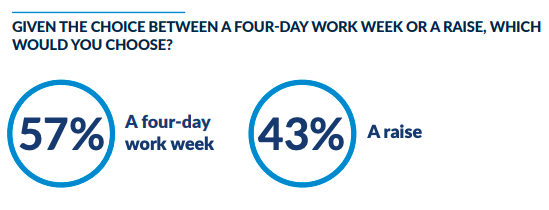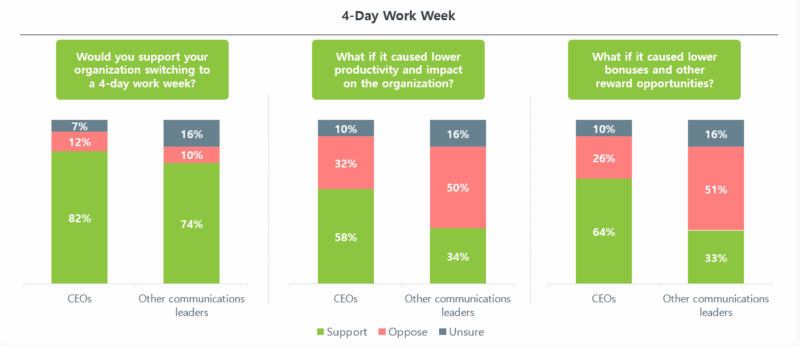Auto workers strike highlights 4-day workweek, flexible employee comms
A closer look at the impacts of labor strikes and the lessons we can learn.

As the United Auto Workers strike continues this week, a few different workplace issues have come into focus. Among the workers’ demands are higher compensation, increased job security, and a four-day workweek. Looking back on a strike-heavy couple of months let’s look at the comms lessons that can come from this trend—along with the longer-term impacts that flexible work can bring employees across industries.
Vermont Senator Bernie Sanders told CNN that the rise of AI merits a shorter workweek:
“We are looking at an explosion in this country of artificial intelligence and robotics. And that means that the average worker is going to be much more productive,” Sanders said. “The question as a nation that we have to ask ourselves is: Who is going to benefit from this productivity? We should begin a serious discussion — and the UAW is doing that — about substantially lowering the workweek.”
The 4-day workweek gains horsepower among communicators
The idea of a four-day workweek is something many communicators support, according to Ragan’s 2023 Salary and Workplace Culture Survey. The report, which surveyed communications professionals across demographics and industries, found that:
- 57% of respondents said they’d take a four-day workweek over a pay raise.
- 58% of women who responded to the survey said they’d take a four-day workweek over a raise, with 51% of men saying the same.
- There was also a generational trend, with 60% of Millennials, 56% of Gen Z, and 53% of Gen X and Boomers saying they’d rather have the extra day off than more money in their paycheck.
The data shows that leaders overwhelmingly support a shorter workweek too, but have some concerns.
Leaders support a shorter week, too
Last year, HarrisX and Ragan partnered on a study of CEO perceptions and found that:
- 82% of CEOs and 74% of other comms leaders said that they’d support a four-day workweek.
- When asked if a four-day workweek should still be implemented even if it impacted productivity, 58% of CEOs still said they’d support it, with just 34% of other comms leaders agreeing.
With data like this, it’s clear that the members of UAW aren’t alone in their desire for a shorter work week.
The wide support across communicators suggests that more polling of specific employee preferences for optimal schedules is needed to understand how they can best support the business and how the business can support them.. Communicators should consider taking the lead in helping HR collect this data, crafting a strategy around it and presenting it to leaders.
Flexibility and smart communication
The UAW’s sticking points against the auto manufacturers also speak to the larger conversation about creating a flexible workplace culture and how communicators can support it. In the Ragan Salary and Workplace Survey, 64% of communicators cited flexible work as their most desired ‘soft benefit.’
While many frontline workers are not afforded the ability to work from home at all, the events of this week suggest that is changing. The UAW strikes, along with the film and television strikes, present a rare opportunity for communicators in those sectors to listen to a body of workers who present demands with a unified voice of solidarity.
Auto workers have demanded a four-day workweek that has generally been thought of as a benefit for remote and hybrid organizations exclusively. Expect other frontline labor unions to follow.
These strikes aren’t just an opportunity for workers to be heard, but for communicators to rethink how flexibility factors into their employee comms across industries and workforces.
Sean Devlin is an editor at Ragan Communications. In his spare time he enjoys Philly sports, a good pint and ’90s trivia night.









